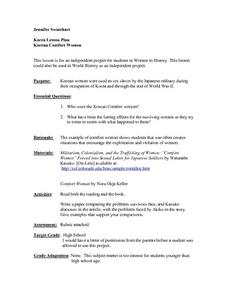Curated OER
THE OCCUPATION OF KOREA BY JAPANESE IMPERIALIST FORCES
Students read and respond to a history of Korea. In this occupation lesson, students work in groups to research the effects of Japanese occupation and create an illustrated timeline. Students listen to a lecture and write an acrostic....
Curated OER
Coming of Age During Japanese Occupation: Richard E. Kim's Lost Names: Scenes from a Korean Boyhood
Explore the implications of the Japanese occupation of Korea during World War II. Learners read Lost Names: Scenes from a Korean Boyhood, participate in classroom discussions about the novel and keep journals in which they respond to...
Curated OER
Lost Names: Scenes From a Korean Boyhood,
What a great resource to share! Based on the book Lost Names by Richard Kim, this valuable lesson focuses on the Japanese occupation of Korea during WWII. Additionally, it employs first-person journaling as a mode of understanding themes...
Curated OER
Map Work About the Korean War
Students use an interactive website that chronicles the occupation of the Korean peninsula by each year and complete a worksheet. This helps them to research the causes of the Korean War.
Curated OER
March First Independence Movement
Students study the pro-independence movement of 1919 in Korea. In this Korean history lesson, students investigate the implications of Japanese occupation of Korea and create posters that feature the essence of the Korean...
Curated OER
What's In a Name?
Students explore the relationship between names and certain cultures and locations. In this identity lesson, students create family migration or immigration maps. Students read excerpts from When My Name was Keoko and Lost Names: Scenes...
Curated OER
Korean Comfort Women
Students examine the use of women as slaves by the Japanese military during World War II. Using the internet, they research the purpose of Korean comfort women and identify how the women have dealt with the exploitation. They share...
Curated OER
Year of the Impossible Goodbyes by Sook Nyul Choi
Students analyze Korean culture from their literature piece. They investigate the theme of oppression by an occupying army. Students encounter courage, resistance movements and explore the underground railroads.
Curated OER
When My Name Was Keoko
Students construct a book banquet to help us to recall and enjoy food eaten in Korea during the 1940's. The class is to read When My Name Was Keoko and then create a book banquet that the students invite their parents to. Students cook...
Foreign Policy Research Institute
Understanding the Koreas
Though this resource was designed in 2005, US tension with North Korea remains a relevant topic for exploration and understanding. Unfortunately, this lecture and reading-based lesson is unlikely to engage the class. The end product is a...
Curated OER
Lesson Plan on Korea
Students read a variety of novels and watch clips of films through which they begin to feel empathy for cultures and countries occupied by foreign countries. They have the option of studying the Sino-Japanese Wars or the Russo-Japanese...
Curated OER
Japan's Economic Miracle
Students explore the concepts of price and demand. In groups, pupils simulate the purchase and selling of land in Japan. They create a loan, and make decisions to buy or sell as the economic market fluctuates. Classmates discuss their...
Curated OER
World War II in the Pacific and the End of the War
Students study the World War in the Pacific. In this Geography lesson, students develop an awareness of key issues and events from the conflict. Students write a well-organized essay describing this event.














